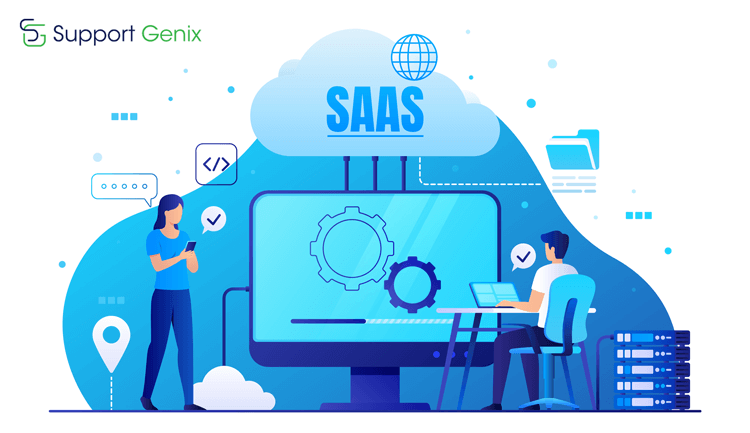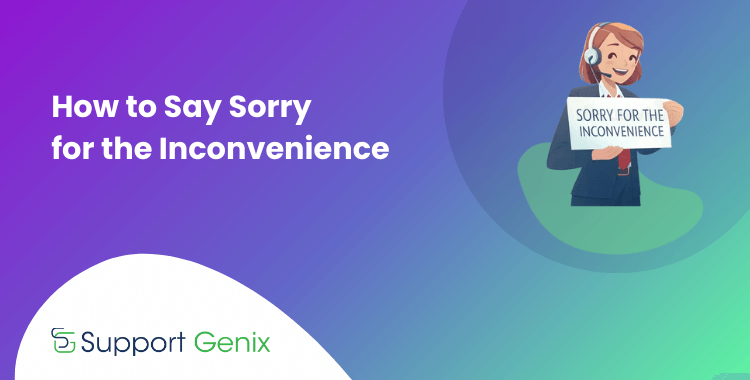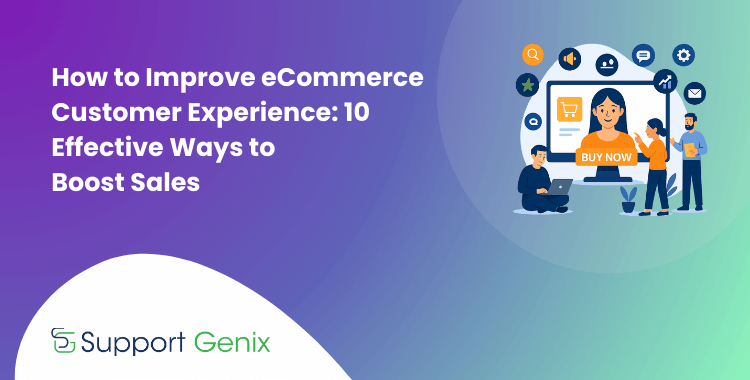What is SaaS Customer Support? A Comprehensive Guide for Beginners
Are you starting a SaaS business and wondering if you really need customer support? Good customer support helps users with problems and teaches them about your product. It fixes issues, shows how things work, and makes users happy. This support builds a strong bond between your business and its customers.
If you’re new to this, figuring out SaaS customer support might seem hard. But it’s very important for keeping your business growing and successful. When you solve problems and help quickly, people start to trust your product more.
Understanding the basics of SaaS customer support is essential for beginners. In this guide, we’ll explore what is SaaS customer support?, its importance, key components, and more. Let’s get started.
Support Genix
WordPress Support Ticket Plugin
Take Your Customer Support to The Next Level and Boost Customer Satisfaction Rates
Understanding the Basics: What is SaaS?
Definition of SaaS
SaaS is a term that is often thrown around in the tech world, but what does it mean? SaaS refers to hosting software on the cloud and accessing it online instead of downloading it onto a device.
The service provider manages the infrastructure, software updates, and security measures. This model has become increasingly popular because it allows for greater flexibility, scalability, and lower upfront costs for businesses.
Brief history of SaaS
In the past decade, Software as a Service (SaaS) has gained popularity in the business world. This kind of software is delivered over the internet, so there’s no need for physical installation. It allows businesses to use applications from anywhere and on any device easily.
The first SaaS model started in the early 1999s with companies like Salesforce, and now it includes various services like email marketing, project management, and accounting. One great thing about SaaS is that it can often be adjusted to fit the specific needs of each business.
Many SaaS providers also give much customer support to ensure their clients get the most out of their software. Knowing the basics of SaaS is important for modern businesses that want to stay competitive and make their operations more efficient.
Why is customer service important for a SaaS company?
Customer service is vital for a SaaS (Software as a Service) company for several reasons:
- Customer Satisfaction: Happy customers stay with the service because they feel the company cares about their experience. This satisfaction builds trust and loyalty towards the SaaS company.
- Retention and Revenue: Happy customers are more likely to renew their subscriptions and explore additional services. This loyalty translates into consistent revenue and growth opportunities for the company.
- Reputation and Referrals: Excellent customer service boosts the company’s reputation, making it stand out. A strong reputation encourages satisfied customers to refer others, expanding the customer base.
- Competitive Advantage: Good customer service provides a competitive edge in the crowded SaaS market. It differentiates the company, making it the preferred choice over competitors.
- Feedback for Improvement: Customer feedback highlights areas for improvement and innovation in the service. This feedback is crucial for making the service better and staying ahead of competitors.
What is SaaS Customer Support?

SaaS customer support is a dynamic, cloud-based service model aimed at enhancing user experience. It employs innovative technologies like AI and real-time messaging to offer immediate assistance. This support system ensures users can maximize the benefits of their software without delays. Efficiently scalable, it allows businesses to adapt their support capabilities as they expand.
Benefits of SaaS Customer Support
SaaS customer support is important for several reasons, as highlighted by industry experts and publications:
Enhances Customer Experience
Providing excellent customer support improves the overall experience for SaaS customers. It ensures prompt assistance, effective issue resolution, and ongoing support. This increases satisfaction and a positive perception of the company and its product.
Increases Customer Retention
Effective customer service is essential to maintain customer retention. When customers receive prompt and useful assistance, they are more inclined to keep using the SaaS product, renew subscriptions, and stay loyal.
Improves Productivity and Efficiency
SaaS customer support is there to help users make the most out of the software. Support agents can help users understand features, fix technical problems, and use the software better. This keeps things running smoothly and ensures customers get the most value from the product.
Recommended Blgos for You
👉 7 Best Zendesk Alternatives You Should Consider: Find the Best Help Desk Solution
👉 How to Train Your Customer Support Team to Provide Exceptional Service
👉 How to Measure Customer Service Performance: The Ultimate Guide
👉 How to Scale Customer Support: Super Effective Ways
👉 10 Tips for Providing Excellent Customer Service with a Support System
Key Components of SaaS Customer Support
SaaS customer support is vital for retaining users and driving company success. It ensures a seamless, satisfying user experience with the service offered. The key components of SaaS customer support include:
Multichannel Support
SaaS companies should offer support through various phone, email, live chat, and social media channels. This lets customers choose their preferred communication method and ensures they can easily reach out for assistance.
Self-Service Options
Providing self-service options empowers customers to find solutions independently. This includes a knowledge base, FAQs, video tutorials, and community forums. Self-service options reduce the need for direct support and enable customers to resolve issues independently.
Ticketing System
A ticketing system helps streamline support requests by assigning unique identifiers to each customer inquiry. This allows support agents to track and prioritize tickets, ensuring that every request is addressed promptly and efficiently.
Knowledge Base
A comprehensive knowledge base is a centralized repository of information about the SaaS product. It contains documentation, guides, troubleshooting steps, and best practices. A searchable knowledge base enables customers to find answers to questions and access helpful resources quickly.
Reporting and Analytics
Reporting and analytics provide insights into customer interactions and support effectiveness. They help identify trends, issues, and areas for improvement in service. This data drives strategic decisions to enhance overall customer satisfaction and retention.
Best Practices for SaaS Customer Support
Based on recent findings and expert analyses from various sources, here are five best practices for SaaS customer support:
Personalized Customer Interactions
Providing personalized interactions creates a positive customer experience. Support agents should address customers by name, listen actively to their concerns, and tailor solutions to their specific needs. Personalization helps build rapport and fosters a sense of trust and satisfaction.
Proactive Support
Instead of waiting for customers to reach out with issues, proactive support involves anticipating and addressing potential problems before they arise. This can include sending proactive notifications, providing helpful tips and resources, and contacting customers to ensure they get the most value from the product.
Continuous Training and Development
Regular training and development programs for support agents are essential to keep them updated on product updates, industry trends, and customer service skills. Ongoing training ensures that agents have the knowledge and skills to provide effective support and handle various customer scenarios.
Feedback and Improvement
It is critical to Actively seek customer feedback and use it to improve the support process. Motivate customers to share their thoughts using surveys, reviews, or direct communication channels. Examine the feedback to pinpoint areas that need improvement and make necessary changes to improve the overall customer support experience.
Choosing the Right SaaS Customer Support Solution
When choosing the right SaaS customer support solution, consider the following factors:
- Scaling with Your Business: Make sure the customer support solution can grow as your business does. It should handle more customer questions and tickets as your business expands without slowing down or taking longer to respond.
- Easy Integration: Choose a solution that fits your current systems and tools well. This makes data transfer smooth, keeps customer info in sync, and makes work easier across different departments like sales, marketing, and support.
- Tailored to Your Needs: Your SaaS customer support solution should let you customize things to match your brand and specific support needs. This includes changing the look, handling tickets, using automation, and other features that fit your unique requirements.
- Keeping Things Secure: Protecting customer data is important. Check that the support solution has strong security measures like encryption, secure data storage, and access controls. Make sure the vendor has the right security certifications.
- Cost and Value: Consider how much the customer support solution costs and if it gives you good value for its offers. Compare prices, subscription plans, and any extra setup, training, or ongoing support costs.
Implementing SaaS Customer Support
- Assessing the Current Support System: Look at how you currently handle support- the tools you use, the way you do things, and the resources you have. Find out what’s working well what needs improvement, and listen to customer feedback to see where there are problems.
- Training Staff: Train your support staff on how to use the new SaaS customer support system. Ensure they know all the features, how things flow, and the best ways to do their job. Train them on handling different customer questions, solving issues, and giving great service.
- Migration Process: Plan smoothly to shift from your old support system to the new SaaS solution. Moving customer data, setting up ways to handle tickets, using automation, and connecting with other tools. Work closely with the SaaS provider to make sure everything goes well.
- Testing and Optimization: Before using the new system completely, test it out thoroughly. Find any problems and fix them. Monitor customer feedback, how your team is doing, and the numbers. Regularly check and improve how support works to make things more efficient and keep customers happy.
Support Genix
WordPress Support Ticket Plugin
Take Your Customer Support to The Next Level and Boost Customer Satisfaction Rates
Measuring Success in SaaS Customer Support
Customer Satisfaction Metrics
Use surveys like CSAT or CES to find out how happy customers are with the support they get. These surveys help spot areas that need improvement and track overall customer happiness.
Response and Resolution Time
Keep an eye on how quickly customer support responds and solves issues. Indicators such as the average response time and resolution time guarantee prompt assistance to customers, ensuring swift resolution of their issues.
Customer Retention Rate
The SaaS product’s customer retention rate reflects the proportion of customers who stay loyal to the service for a specific duration. A high retention rate means customers are happy and loyal, and it reflects the quality of customer support.
Net Promoter Score (NPS)
The Net Promoter Score (NPS) gauges the likelihood of customers recommending a company’s product or service. It gives an overall idea of customer loyalty and satisfaction. By collecting NPS feedback, SaaS companies can identify loyal customers (promoters) and unhappy ones (detractors) and take steps to improve customer support.
Frequently Asked Questions
What channels are commonly used for SaaS customer support?
Commonly used support channels in SaaS customer support include email, live chat, phone support, helpdesk ticketing systems, and self-service knowledge bases. Some companies may also utilize social media platforms or community forums for support interactions.
How does SaaS customer support differ from traditional support?
SaaS customer support focuses on cloud-based service efficiency and real-time assistance. Unlike traditional support, it emphasizes quick, digital product-specific solutions, enhancing overall user satisfaction.
What trends are shaping the future of SaaS customer support?
Emerging trends in SaaS customer support include AI-driven automation for quicker issue resolution and personalized customer service experiences. The rise of self-service through comprehensive knowledge bases and intuitive chatbots is also notable.
How can SaaS customer support teams collaborate with other departments in the company?
SaaS customer support teams can collaborate with other departments by sharing customer feedback with product development, coordinating messaging with marketing, and resolving technical issues with IT. This collaboration enhances product offerings and improves customer experiences.
What role does self-service play in SaaS customer support?
Self-service is required to SaaS customer support, providing users with instant access to information through knowledge bases and automated chatbots. It empowers customers to resolve their issues swiftly while allowing support teams to concentrate on more complex inquiries.
Final Word
What is SaaS Customer Support? SaaS customer support is a vital aspect of any software-as-a-service solution. As a beginner, it can be challenging to navigate the terminology and understand what it entails. This comprehensive guide breaks down everything you need to know about SaaS customer support, from its definition to the various best practices.
Whether you’re a SaaS provider or a customer seeking support, this guide provides valuable insights into ensuring successful communication and problem resolution. By the end, you’ll thoroughly understand what SaaS customer support is and how to implement it effectively.

